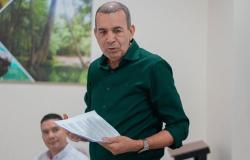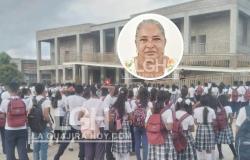The ll Valledupar Book Fair, FELVA 2024, continues its course, and on its second day, local writers continue presenting to the Vallenato community literary works that enrich the knowledge of those people who manage to obtain them.
One of these works is ‘The Vegetable Voice of the Wind’, a book that focuses on highlighting the natural environments that differentiate the department of Cesar, and characters from the region who made significant contributions to the history of this part of the region.
“This book has a didactic, pedagogical mission, a review of Cesar writers, some already deceased, embarking on reading and poetry as the essence of life. Here we talk about the heroine María Concepción Loperena, then a tribute to some writers and we also talk about ecology as a way to defend nature”explained José Atuesta Mendiola, Vallenato writer.
Read also: Second edition of Illustrated Poems presented at the II Valledupar Book Fair
This work seeks to highlight and keep alive the environment that characterizes the department, traditions that have been maintained for years, as linguistic expressions very typical of the Caribbean region. “The essence of this work is to value life and biology, as an essence for social development”added the writer.
Likewise, Atuesta Mindola was grateful for the opportunity and highlighted this type of events that aim to enrich and motivate reading in society. “Thank you to the Mayor’s Office of Valledupar for giving us this space and that EL PILÓN continues to make more versions of this fair.”
BY YUSTIN VARELA/EL PILÓN
#Colombia






